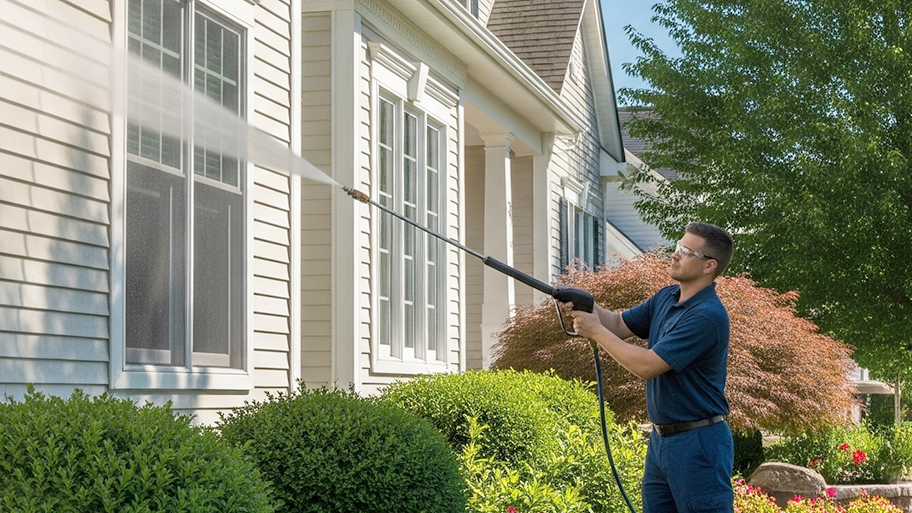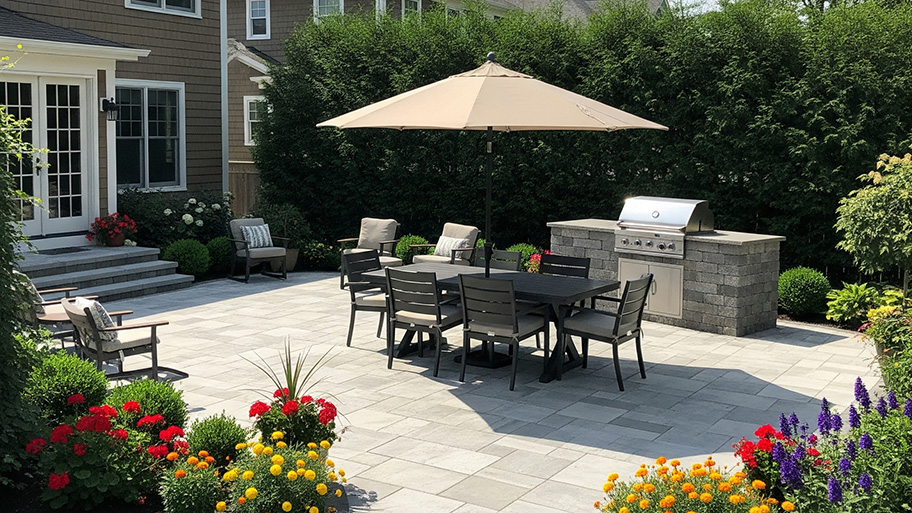
Need to breathe new life into your dirty siding and trim? Explore the cost to pressure wash a house to boost your curb appeal instantly.
Spray your way to a pristine driveway


A surface cleaner attachment is the best tool for cleaning a driveway
Ensure your attachment has the right fitting size and can handle the PSI of your pressure washer
A brush, spray nozzle, or broom can help remove tough stains and clean out crevices
Choose a detergent injector and soap nozzle when treating stains or mildew
Use two extender wands to make the job more ergonomic
Using a pressure washer to clean your driveway, patio, or garage floor is a quick, effective way to restore a pristine surface. But pressure washer attachments differ in how well they clean, how fast they clean, and how much they strain your body. Here is a complete guide to pressure washer attachments for driveways and when to use each.

When choosing a pressure washer attachment to clean your driveway, ensure it’s compatible with the model of your pressure washer. You can choose attachments from any brand as long as matches in two key areas:
The size of the fitting (also called the connection size)
The max PSI
Read the fine print of the attachment to ensure it fits your machine and can handle the pressure.


The best pressure washer attachment for driveways is a surface cleaner. It's a round tool that has an internal rotating spray bar that sprays consistently without leaving streaks. It cleans a large, flat surface easier and more effectively than any other type of attachment. A surface cleaner makes cleaning a driveway faster while causing minimal strain on your body. Ideally, your pressure washer should be approximately 3000 PSI and 3 GPM for strong pressure and heavy water flow.
When selecting a surface cleaner, look for a model that is approximately 15 inches in diameter (allows for quick, thorough cleaning). Choose a surface cleaner with three wheels for easy gliding and swiveling across the driveway's surface. You can rest the attachment on the driveway instead of needing to hover it in the air. Look for stainless steel construction to ensure the tool lasts as long as possible. Use two extender wands for less wear on your body — you can stand up straight while cleaning.
Above all, a surface cleaner helps lift stains, dirt, debris, and grime from your driveway. Because experts recommend you clean your driveway once a year, invest in a surface cleaner that you can use year after year. You can also hire a local pressure washing company to handle the deep cleaning for you. The cost to pressure wash a driveway ranges from $100 to $500, or an average of $100 to $250, depending on the size of your driveway.
A water broom is a horizontal rod with two or more built-in sprayers that has a wheel at each end. It attaches to the end of your pressure washer and offers a flat, wide spray. It can clean a large surface or help you reach cracks and tight spaces such as underneath a vehicle or near driveway edging

You can find a range of spray nozzles to adjust the type and intensity of the spray. Some nozzles have several spray options built-in, allowing you to use the same attachment for different tasks. From cleaning the crevices in your driveway to removing driveway stains, a spray nozzle can be a handy tool. But using a spray nozzle for an entire driveway often takes a long time due to the smaller stream. It also isn't as thorough and consistent as a surface cleaner.
A brush attachment for your pressure washer allows you to clean more detailed areas of your driveway, vehicles, or patio. Driveway brushes clean concrete, asphalt, and other types of driveways. A brush with stiff bristles can help you remove dirt, tire marks, and oil stains but isn't recommended for the full driveway.
A vehicle brush can help you get into the crevices of your car, truck, RV, or boat. A pool brush helps you clean pool decks and patios. Deck brushes clean wood and composite decks.
A detergent injector is a container attachment where you can use soap or detergent with your pressure washer. If you’re trying to remove stains or mold from your driveway, using a detergent injector can help ease the stain and remove it. Ensure you have a soap nozzle or nozzle that's compatible with spraying cleaner.
Beyond the pressure washer attachments for driveways, you may want to invest in some accessories to make the job easier and to properly maintain your pressure washer.

An extension wand attaches to the end of your pressure washer wand and allows you to reach high surfaces or hard-to-reach places. The extra length can help your posture when cleaning a driveway, reducing the strain on your body. Extender wands can also be helpful when cleaning your gutters, eaves, and windows, or your vehicle or boat.
A pump protector helps ensure your pressure washer doesn’t freeze, crack, or corrode during the winter or off-season. A pump saver sprays a white protective foam inside the pressure washer port to seal it and prevent harmful buildup. It protects and lubricates the internal parts, allowing your pressure washer to last for many years to come.
A pressure washer gauge measures the amount of pressure your machine exerts, allowing you to better adjust for the surface you’re cleaning. If cleaning a more fragile surface, you can lower the PSI. If cleaning a durable surface like a driveway, you want to have a PSI of 2500 to 3000. A gauge attaches to the end of your wand and produces a reading.
You may need to replace your pressure washer hose at some point or extend your hose for longer reach. Ensure you have the right type and connection size for your specific pressure washer. Unlike a garden hose, a pressure washer hose can withstand high levels of water pressure, so they're usually made of PVC or reinforced rubber. Rubber pressure washer hoses are more flexible, while PVC hoses are more durable and can withstand higher pressure.
From average costs to expert advice, get all the answers you need to get your job done.

Need to breathe new life into your dirty siding and trim? Explore the cost to pressure wash a house to boost your curb appeal instantly.

The cost to pressure wash a patio depends on the size of the surface and the type of patio you have, as well as whether you DIY or hire a pressure washing pro.

Pressure washers can help you keep your home looking great. Use this guide to learn how much it costs to rent a pressure washer based on factors like type and time.
Pressure washers have many uses from cleaning patios to scrubbing cars. This guide covers the most common pressure washer uses to help you make the most of this tool.

Learn how to add a pressure gauge to a pressure washer for better control and accuracy. A pressure gauge is especially helpful for cleaning sensitive surfaces.

Learning how to clean stucco can involve a pressure washer for convenience, but you also can use other methods. We’ll explain what to do for proper cleaning.